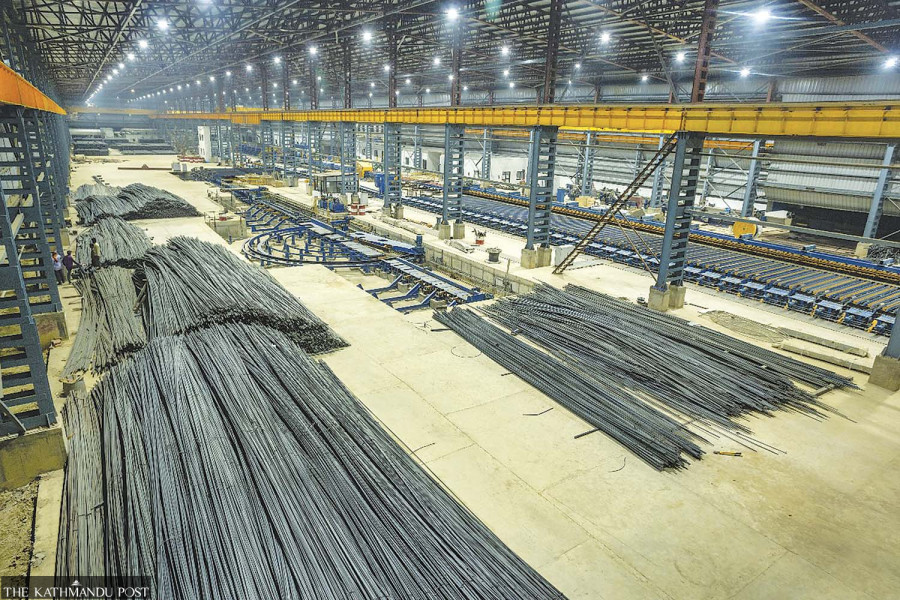Money
Nepal’s sponge iron producers seek waiver of duties
The budget has reintroduced the 2.5 percent customs duty on sponge iron imports that was waived three years ago to encourage billet manufacturing.
Dipendra Baduwal
Industrialists have warned that high taxes, which will lead to higher prices, may hurt Nepal’s sponge iron manufacturing and could threaten the country's overall steel output in the short term.
Three years ago, the government, through the budget, announced customs duty waivers on sponge iron and related raw materials imported from India to encourage manufacturing of billet in the country by importing raw materials.
Rajesh Kumar Agrawal, chairman of the industry committee of the Federation of Nepalese Chambers of Commerce and Industry, said the government had decided three years ago to waive customs duty to encourage investment.
The then finance minister Janardan Sharma cut the duty imposed on sponge iron to 1 percent in the budget for 2022-23.
The budget then imposed an excise duty of Rs2.50 per kg on finished billet imported from India.
He had totally waived customs duty on imported pig iron and scrap.
Finance Minister Barsha Man Pun, however, reintroduced the customs duty to 2.5 percent on sponge iron imports and 1 percent on pig and scrap iron imports in the budget for the next fiscal year beginning mid-July. The budget was announced on May 28.
Industrialists warn that they would knock on the court’s door if the government failed to roll back its decision.
They said that the policy had been amended in a short period to discourage investment.
"Instead of encouraging investment, the government has changed the policy out of nowhere," said Agrawal in a press meeting in Bhairahawa last week.
“The government has taken an unpopular move without taking advice and inputs from the private sector. The government has not done any study before reintroducing the policy."
“This is a policy flaw. It needs to be corrected.”
Steel and iron producers say that such policies may harm the manufacturing industry in the long term. "If we want to become self-reliant on iron, there is a need for an encouraging environment. But unfortunately, the government is least bothered."
The industrialists, who have been importing raw materials and producing iron rods through melting, have been requesting the prime minister and finance minister, as well as leaders of various political parties, to roll back the decision.
"Due to the government’s policy three years ago of encouraging iron and steel industries, investors decided to pour money into the manufacturing sector. But the abrupt changes in policy have put them in a fix," Agrawal said.
Five melting furnace factory plants were in operation three years ago. Due to the new policy, the number of such factories increased. In three years, the number of melting furnace plants has increased to 18.
Five are in Rupandehi, four in Morang, seven in Birgunj, and one each in Kapilvastu and Banke.
The iron and steel industry manufactures billets by mixing scrap material with imported sponge iron from India. The billet produced within the country is made from 75 percent sponge iron and 25 percent scrap iron. The billet produced this way is rolled and made into iron rods.
Agrawal said Rs36 billion had been invested in a dozen and a half such plants, which employ 5,000 people and produce around 2.3 million tonnes of iron rods annually.
With the government policy of producing billet within the country, the rolling mills also installed the melting furnace technology at that time. They invested Rs1 billion more into the technology, said Agrawal.
The finance ministry encouraged the private sector to open such plants to increase electricity consumption within the country, and this industry pays electricity bills amounting to Rs15 billion annually.
However, with the government preparing to provide a waiver in excise duty on billets at customs points, the rolling mill operators in Rupandehi have expressed their happiness.
The government, through the budget for the upcoming fiscal year, has announced the removal of an excise duty of Rs2,500 per tonne on imported billets imposed at customs points.
The government provision has created hope for the industries that were shut down.
The rolling industry entrepreneurs in Rupandehi and neighbouring districts who were producing iron rods by importing billet have been conducting phase-wise protests for two years to remove the customs and excise duties.
The industrialists said that the government, understanding reality, has decided to remove the excise duty, which they said is a justifiable decision from the government.
"The government, through the budget, has addressed our demand partially," said Dhurba Kumar Shrestha, vice-chairman of Panchakanya Group. "The rolling mill industry entrepreneurs were confident that the government would address our demand one day as millions of investment was about to sink.”
With the issuance of Financial Bill 2024, it has created an environment for the iron industry, which is produced using imported billets, to compete in the market, Shrestha said.
Shrestha said that the customs charges need to be uniform when importing raw materials for the industry that produces the same goods, and this is the major demand of rolling mill operators.
With the government's change in policy, employment will regenerate. Half a dozen plants produce iron rods by rolling imported billet from India.




 22.65°C Kathmandu
22.65°C Kathmandu














